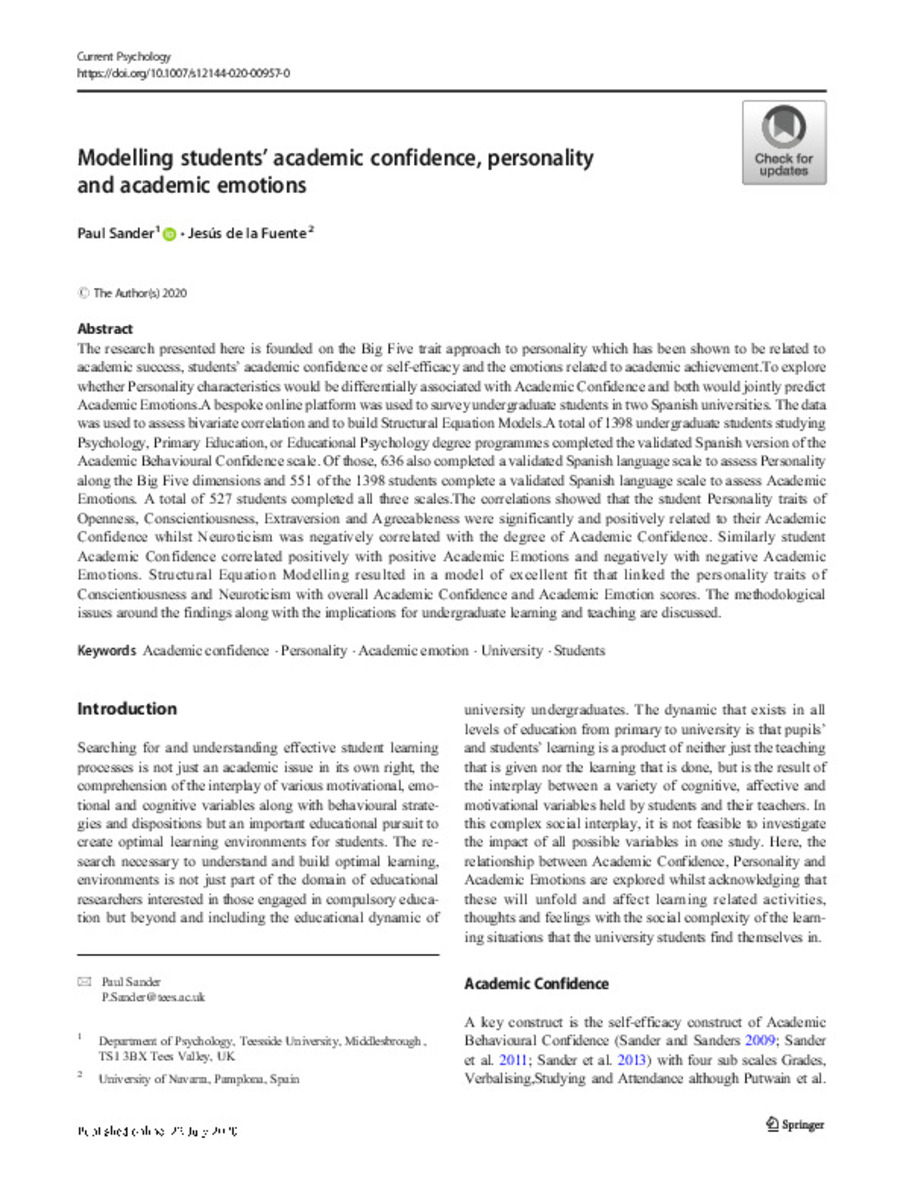Full metadata record
| DC Field | Value | Language |
|---|---|---|
| dc.creator | Sander, P. (Paul) | - |
| dc.creator | Fuente-Arias, J. (Jesús) de la | - |
| dc.date.accessioned | 2022-08-22T10:06:31Z | - |
| dc.date.available | 2022-08-22T10:06:31Z | - |
| dc.date.issued | 2022 | - |
| dc.identifier.citation | Sander, P.; de la Fuente-Arias, J. (Jesús Enrique). "Modelling students, academic confidence, personality and academic emotions". Current psychology. 41, 2022, 4329 - 4340 | es |
| dc.identifier.issn | 1046-1310 | - |
| dc.identifier.uri | https://hdl.handle.net/10171/64027 | - |
| dc.description.abstract | The research presented here is founded on the Big Five trait approach to personality which has been shown to be related to academic success, students¿ academic confidence or self-efficacy and the emotions related to academic achievement.To explore whether Personality characteristics would be differentially associated with Academic Confidence and both would jointly predict Academic Emotions.A bespoke online platform was used to survey undergraduate students in two Spanish universities. The data was used to assess bivariate correlation and to build Structural EquationModels.A total of 1398 undergraduate students studying Psychology, Primary Education, or Educational Psychology degree programmes completed the validated Spanish version of the Academic Behavioural Confidence scale. Of those, 636 also completed a validated Spanish language scale to assess Personality along the Big Five dimensions and 551 of the 1398 students complete a validated Spanish language scale to assess Academic Emotions. A total of 527 students completed all three scales.The correlations showed that the student Personality traits of Openness, Conscientiousness, Extraversion and Agreeableness were significantly and positively related to their Academic Confidence whilst Neuroticism was negatively correlated with the degree of Academic Confidence. Similarly student Academic Confidence correlated positively with positive Academic Emotions and negatively with negative Academic Emotions. Structural Equation Modelling resulted in a model of excellent fit that linked the personality traits of Conscientiousness and Neuroticism with overall Academic Confidence and Academic Emotion scores. The methodological issues around the findings along with the implications for undergraduate learning and teaching are discussed. | - |
| dc.description.sponsorship | The research was supported by the R&D Project PGC2018–094672-B-I00 (Ministry of Science and Education, Spain), UAL18-SEJ-DO31-A-FEDER (University of Almería, Spain), and the European Social Fund. | - |
| dc.language.iso | en | - |
| dc.rights | info:eu-repo/semantics/openAccess | - |
| dc.subject | Academic confidence | - |
| dc.subject | Personality | - |
| dc.subject | Academic emotion | - |
| dc.subject | University | - |
| dc.subject | Students | - |
| dc.title | Modelling students, academic confidence, personality and academic emotions | - |
| dc.type | info:eu-repo/semantics/article | - |
| dc.description.note | This article is licensed under a Creative Commons Attribution 4.0 International License | - |
| dc.identifier.doi | 10.1007/s12144-020-00957-0 | - |
| dadun.citation.endingPage | 4340 | - |
| dadun.citation.publicationName | Current psychology | - |
| dadun.citation.startingPage | 4329 | - |
| dadun.citation.volume | 41 | - |
Files in This Item:
Statistics and impact
Items in Dadun are protected by copyright, with all rights reserved, unless otherwise indicated.






